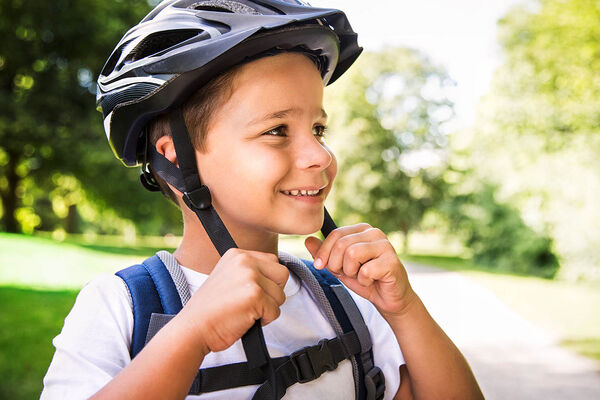Health checks for children and young people
Regular health checks for the benefit of your young ones
With us, you can expect to take advantage of more than just the legally required health checks to give you the added peace of mind that your child is progressing just as they should. After all, many illnesses and developmental disorders in children and young people can be treated properly if they are picked up early enough. This is exactly why health checks are so important. U-Check-ups and J-Check-ups (health screening for children and adolescents) are designed to support your child’s development and are included in our health checks. These are one of the most essential foundations of any comprehensive healthcare service along with the necessary vaccinations and dental care.
Health checks for children and young people – the details
| Examination type | Age | Scope of examination |
|---|---|---|
U1 | After birth | Skin colour, breathing, muscle tone, reflexes, heartbeat |
| Advanced newborn screening | 1–3 days old | Blood test to check for metabolic disorders |
| Newborn hearing screening | 1–3 days old | Exclusion of hearing impairments from a hearing loss of 35 dB |
| Cystic fibrosis screening | 1–3 days old | Generally a blood sample taken during advanced newborn screening |
| Pulse oximetry screening | 2 days old, by U2 at the latest | Measurement of the blood oxygen levels using a light sensor on the baby’s foot. Low oxygen levels can be a sign of congenital heart defects. |
| U2 | 3–10 days old | Body measurements, abnormalities in the skin, chest, stomach and genitals, skeleton, sensory organs, motor skills, reflexes, formation of the hip joint, check for metabolic or hormonal imbalances |
| U3 | 4–5 weeks old | Physical examination similar to U2, age-appropriate development, nutritional state, weight, ocular response, hearing, reflexes, motor skills development, vaccination advice |
| U4 | 3–4 months old | Motion, coordination, response to visual and acoustic stimuli, vaccination advice |
| U5 | 6–7 months old | Head posture, motor skills and coordination (gripping ability), hearing and eyesight, interest in surroundings, vaccination advice |
| U6 | 10–12 months old | Motor skills and coordination, hearing and eyesight, response to strangers, vaccination advice |
| U7 | 21–24 months old | Motion behaviour, language development, comprehension, vaccination advice |
| U7a | 34–36 months old (shortly before 3rd birthday) | Detection of allergies, socialisation problems, behavioural disorders, overweight, language development, dental, oral and maxillofacial anomalies, vaccination advice |
| U8 | 46–48 months old (shortly before 4th birthday) | Organ check, thorough eye examination and hearing test, dexterity test, language development, independence and interpersonal skills, vaccination advice |
| U9 | 60–64 months old (after 5th birthday) | Ability to hear, see and speak, comprehension, behaviour, motor skills, coordination, vaccination advice |
| U10 | 7–8 years old | Detection of dyslexia, motor skills development disorders, behavioural disorders |
| U11 | 9–10 years old | Detection of problems with academic achievement, socialisation and behavioural problems, dental, oral and maxillofacial anomalies, advice on nutrition, exercise, stress, addiction and media |
| J1 | 13 years old | Detection of physical and mental developmental disorders, advanced or delayed onset of puberty, early detection of physical and psychosocial risk factors, behaviours hazardous to health |
| J2 | 16–17 years old | Detection of disorders in puberty, sexual disorders, postural disorders, goitre, risk of diabetes, socialisation and behavioural disorders |
You can download an overview of all health checks as a PDF here:
Additional preventative care services
Here’s how your child can take advantage of health checks
Health checks on newborns take place shortly after birth – there’s no need for you to do anything here. For health checks from U2, please make an appointment with your paediatrician. If you would like to take advantage of health checks U10, U11 and J2 with a participating SBK practitioner, please contact your
Covering the costs of health checks for children and young people
Statutory health checks are conveniently covered through the SBK health care card.
The U10, U11 and J2 health checks, which SBK offers beyond statutory requirements, are also conveniently covered at any participating practitioner through your child’s health care card. You therefore do not incur any private costs for these additional health checks.
However, please keep in mind that private invoices for the U10, U11 and J2 health checks cannot be reimbursed if they are issued by non-participating practitioners. Your personal consultant will be happy to help you find a suitable participating practitioner in advance.
